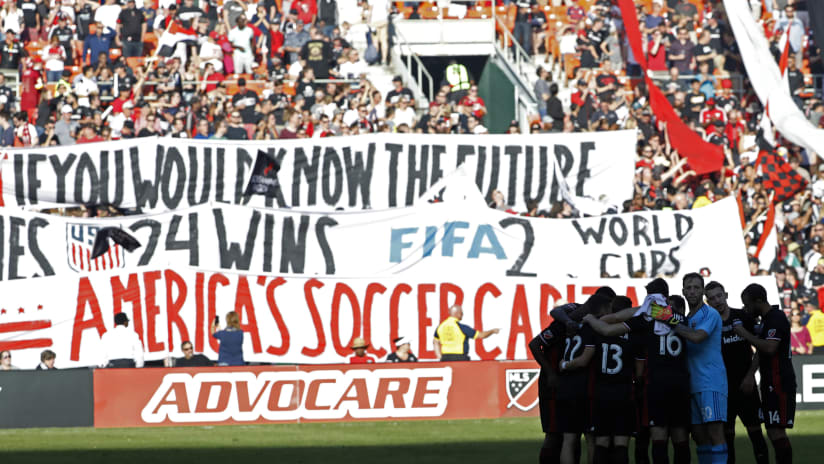WASHINGTON — If you're a twentysomething who has found your way into one of the supporters' groups who supply the colors and noise that make our game great, you could have attended every D.C. United home match during head coach Ben Olsen’s tenure.
You could have read all the testimonials, heard all the interviews, and perhaps even helped paint the banner that read “RFK Stadium = America's Soccer Capital.” You could've watched the YouTube clips — or god help us, the VHS tapes — of the jubilation behind Tony Sanneh at MLS Cup 1997, or Nick Rimando after the 2004 Eastern Conference final.
And still, unless you were here for a US men's national team game, you might've never experienced the full fury of the Old Lady on East Capitol Street.
Until Sunday.
United may have failed to secure the storybook result, ending their last home match at RFK with a 2-1 defeat to bitter rivals the New York Red Bulls. But the 41,418 fans who filed through RFK’s turnstiles one last time ensured this hallowed venue got one final spectacle it deserved.
“Our fans and fan culture and a lot of things that this club got right early on are always going to be there,” said D.C. GM Dave Kasper. “We taught a lot of fans from other cities how to do things. To me, that was the greatest thing about today, was just that level of energy. That level of excitement from the fans and the noise in this building, was tremendous.”
Of all the painful aspects of D.C.’s long, winding and uncertain search for a permanent home that will mercifully conclude with the opening of Audi Field next summer, the most acute was that days like Sunday had become fewer and fewer.
Some of that owed to D.C.’s struggle to keep up with the influx of MLS 2.0 clubs with deeper pockets and more glamorous digs. The Black-and-Red have arguably punched above their weight in reaching the playoffs in four of the last six seasons under Olsen. Even then, they've only reached an Eastern Conference final once in that stretch.
Other culprits include the residue left by the Washington Nationals, whose tenure beginning in 2005 resulted in the permanent loss of lower-level seats behind the West goal, and the immovable force of time.
Among the other notable facts about that 2004 Eastern Conference Final — one that some call the greatest MLS match ever played — is that it was the last game contested under RFK's old configuration.
It didn’t matter Sunday, with fans filling large swaths of the upper deck under that iconic swooping canopy roof, amplifying the electricity that much more. The Barra Brava unleashed streamers from the second level as part of their opening kickoff tifo display. The Red Bulls’ away support bounced all afternoon in the 400 level behind the West goal, where they eventually celebrated Gonzalo Veron’s game-winner and the capture of the Atlantic Cup trophy.
“The loss hurts,” Olsen said afterward. “There’s nothing more frustrating than to not give these fans a win after they put that type of crowd and energy. I can’t fault the guys from an effort standpoint. I mean, I asked them just to give the fans and this building everything they had before the game, and they did that. It’s a little bit of how the year has gone for us.”
United’s season careened off path long before Sunday with a summer swoon that included one point earned across eight league matches.
That loss of control is a frightening feeling on the field. In the terraces, however, it's what made RFK so great. It was a always a uniquely American venue, and yet, if you squinted hard enough, you could imagine the frenzy of Belgrade or Buenos Aires.
"It was a great night, it really [was]," Olsen said, as the last match at RFK wrapped. "It hurts not to send [fans] off with a win. I know it hurts our guys. But in the bigger scheme of things, I think I was able to have a few moments there with myself and appreciate just being a part of the history of this building. I’m very humbled.”














